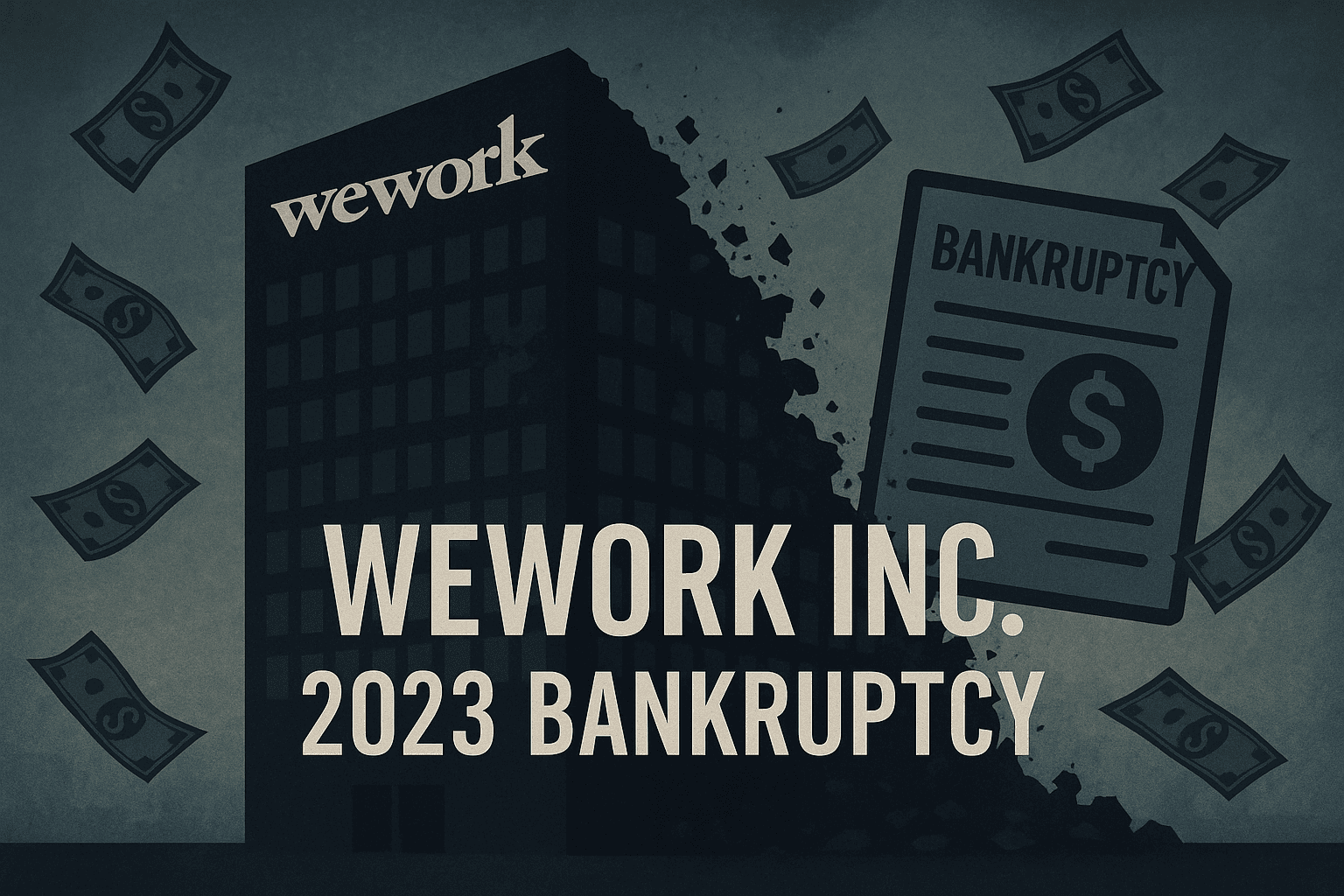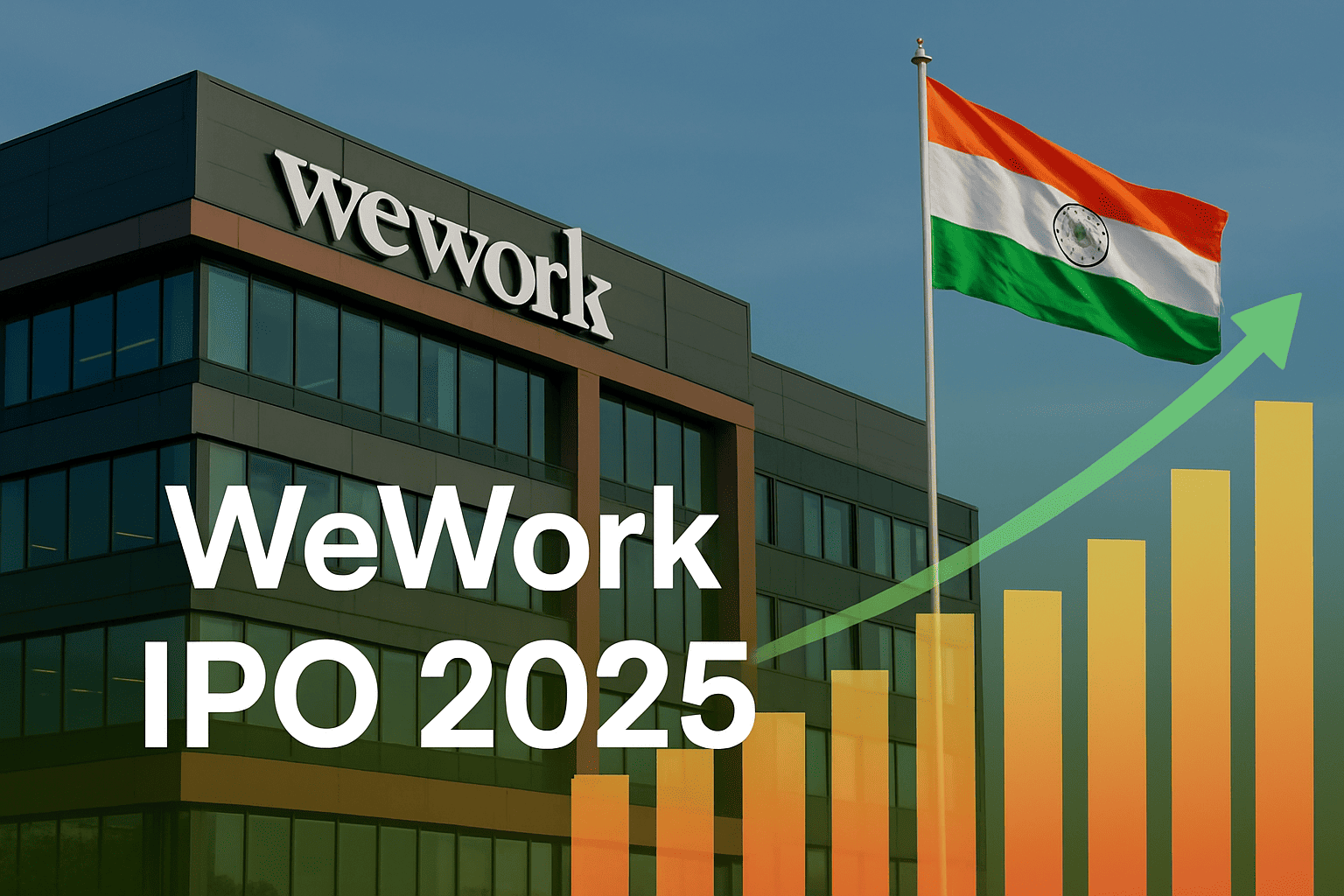The quick and upfront answer is possible, but with important caveats. For starters, WeWork's global brand still carries baggage after its 2019–2024 collapse and restructuring.
However, WeWork India's successful, institutionally backed IPO (≈approximately US$338m / ₹3,000 crore) shows that the India franchise is healthier than the parent and could become a case study in how a strong local operator (Embassy Group) and franchise model can convert brand value into profitable, scalable operations.
That said, investor scepticism, governance questions, high valuations compared to peers, and structural headwinds in the flexible workspace sector mean Wework's IPO in India is an important step, not a guaranteed global resurrection.
How WeWork Fell and Why India is Different?

WeWork's implosion is now familiar: a blistering growth story that peaked in 2019, a failed IPO attempt, governance meltdowns under founder Adam Neumann, a SoftBank rescue, and eventual near-bankruptcy restructuring (debt reduction, lease cancellations) through 2023–24.
The outcome was a leaner global footprint and a company wrestling to prove its unit economics and corporate governance to public markets.
Importantly, however, WeWork India has followed a very different path. In 2024, WeWork Companies exited direct ownership in India, and the franchise was transferred to local real-estate major Embassy Group (and other investors). With local ownership, the India operations focused on profitability, strict cost management, tight cost controls, and selective urban locations regardless of the expense.
That change has produced impressive financial outcomes for the India franchise and set up a public offering in October 2025. The franchise model, local operator and global brand have altered the risk profile and are key to the "India can restore WeWork" argument. [1]
WeWork IPO 2025: What Has It Accomplished in India?
| Metric |
Detail |
| IPO Size |
≈ US $338 million (₹ 3,000 crore) |
| Valuation (Implied) |
≈ US $1 billion enterprise value |
| Listing Date |
Early October 2025 |
| Exchange |
NSE & BSE |
| Offer Type |
100% offer for sale (no fresh issue) |
| Lead Sponsor |
Embassy Group |
| Initial Market Reaction |
Flat to slightly positive debut |
1. IPO Size & Subscription:
The company raised roughly US$338 million (≈₹3,000 crore) in a fully subscribed offering, largely fueled by institutional interest. Retail interest was more restrained.
2. Listing and Market Reaction:
The stock debuted in early October 2025 with a tepid market response, opening near the offer price and trading flat in the pre-open on debut, reflecting investor caution despite the institutional subscription. Subsequent trading showed volatility and some profit-taking. [2]
3. Operational Results:
Public reporting and local media coverage show WeWork India outperformed several local peers on revenue and margins in FY25, despite a smaller footprint, indicating that disciplined operations and premium positioning can work in India's market.
These outcomes underline the core reality: India's franchise has independent operational momentum, but public markets are testing whether that momentum justifies valuation and long-term growth expectations.
WeWork IPO Valuation, Peers and the Public Market's Verdict

While the IPO pricing implied an attractive valuation for franchise investors, it raised questions about whether the price fully accounts for downside risks.
1) Valuation
WeWork India's IPO valuation (with some pre-IPO reports indicating a target approaching $1bn enterprise value) reflects anticipated growth and a premium market position.
Institutional buyers were comfortable, but retail investors and proxy advisors flagged governance, promoter pledges and legal disclosures as reasons for caution.
2) Public Markets' Early Signals
The flat debut and early post-listing trading suggest that the market is underweighting the IPO's bullish thesis or waiting for hard evidence of sustained growth in occupancy, average revenue per user (ARPU), and renewal rates.
Market participants are also comparing WeWork India to local peers (Smartworks, Awfis, Indiqube), and asking whether the premium is justified.
3) Peer Metrics Investors Must Watch
Occupancy %, gross margin per desk, ARR, churn rate, lease expiries, and operating cash flow per location. Outperformance vs peers on these metrics is necessary to sustain a premium.
If WeWork India can continue to boost revenue while enhancing FCF conversion, its valuation will probably benefit in the long run.
Why India Could Be the Place That Revives the WeWork Story?
1. Demand Tailwinds for Flexible Space in India Are Real
India's large and young workforce, along with its growing startup/tech ecosystem, continues to drive demand for flexible office options.
Corporations are increasingly using flexible office space to manage leases and reduce fixed-cost commitments, a structural tailwind for organised co-working operators.
Data from research and the market in 2025 indicate increasing occupancy levels in premium locations within Bengaluru, Mumbai, and NCR, where WeWork India is focused.
2. Local Ownership Changes the Economics
With the help of Embassy Group and various local investors, the India franchise can arrange leases, capital expenditures, and vendor agreements in ways that the global parent was unable to do during its rapid growth.
Local landlords and partners often have different risk appetites and better market knowledge; this can materially improve margins and cash flow.
The franchise model allows a local operator to capture brand premium without exposing the parent to the same overhead or lease liabilities.
3. Institutional Appetite & IPO Proceeds Provide Balance-Sheet Room
WeWork's IPO saw significant institutional interest, raising funds that management can utilise to reduce lease obligations, invest in lucrative locations, or terminate unprofitable contracts, all actions that could expedite achieving consistent profitability. [3]
The Embassy Group reportedly used some proceeds strategically to clean up balance sheet items, which strengthens the local story.
4. A Global Brand With Local Discipline
Brand recognition still matters for large corporates and startups that prefer predictable service levels and global standards.
If local management can deliver consistent occupancy, gross margins and client retention, the brand becomes an asset rather than a liability. Public-market investors can price a stable, franchised operator differently from the pre-2019 global rollout.
All in all, these elements give a credible path for WeWork's India franchise to be profitable, scale selectively and serve as a positive case study, even if the global parent is still rehabilitating its balance sheet and reputation.
Why India's Success Won't Automatically Resurrect WeWork Inc.

It's crucial to be realistic. WeWork India's IPO and operational performance are meaningful but not sufficient to claim a corporate resurrection for the entire WeWork ecosystem. Listed below are several reasons:
1) Different Legal Entities & Ownership:
WeWork India is a franchise and, after 2024, does not carry all the liabilities or leases that troubled the global parent. A strong India showing is not the same as WeWork Inc. returning to its former scale or valuations.
2) Brand vs Balance Sheet
India's healthy margins may reflect disciplined local lease deals and premium pricing. However, they don't erase the structural questions about long-term office demand in saturated US/European markets or the heavy lease exposures that sank the parent.
3) Investor Optics & Governance:
The WeWork name still evokes investors' recollections of the 2019–2020 surpluses. Investor readiness to pay premium multiples for a global recovery is constrained until global governance and transparency demonstrate sustained profitability over time.
Therefore, although India has the potential to restore a lost legacy, it doesn't guarantee a straightforward approval for a significant rebirth of the worldwide WeWork empire. [4]
Risks That Could Derail the India Revival Thesis
Governance & promoter scrutiny
Cyclicality & macro headwinds
Competition and margin pressure.
Lease risk & landlord dynamics
Brand spillovers
Base, Bull and Bear Scenarios for the next 12–24 months
Bull (30%): India continues strong GDP growth, demand from tech and startups stays robust, occupancy rises 5–10% year-on-year, margins improve as scale reduces per-desk costs. WeWork India proves repeatable franchise economics and re-rates toward premium multiples.
Base (50%): Moderate growth, occupancy stable, margins steady; share drifts with the market as investors wait for clear FCF evidence. The company issues periodic buybacks or dividend guidance to shore up investor confidence.
Bear (20%): Macro shock or corporate belt tightening reduces demand for flexible space; governance alerts or litigation surface; market punishes the stock, and valuation compresses below IPO price.
These scenarios help investors size positions and set monitoring triggers (occupancy, ARPU, lease expiries, promoter pledges).
What Should Investors Monitor Next?
Quarterly Occupancy & ARPU Figures
Operating cash flow and free cash flow conversion
Promoter pledges/governance updates
Lease renewal outcomes and landlord terms
Macro signals in India's office demand
Frequently Asked Questions
1. What Is the WeWork India IPO All About?
The WeWork India IPO, launched in October 2025, marks the public listing of WeWork India Management Ltd, the franchise owned by Embassy Group. Unlike the failed 2019 US IPO, this offering represents only the Indian franchise, not the global WeWork Inc.
2. How Did WeWork India's IPO Perform on Listing Day?
WeWork India debuted flat to mildly positive on the NSE and BSE, opening close to its issue price. The initial market reaction was cautious, reflecting investor wariness due to the brand's troubled global history.
3. How Is Wework India Different From Global Wework?
WeWork India is independently managed and operates as a franchisee, not a subsidiary. It has its own financials, leadership team, and lease contracts.
4. Is WeWork India's Stock a Good Investment?
Analysts remain neutral to cautiously optimistic. Institutional investors view it as a mid-risk growth play on India's flexible workspace boom.
Conclusion
In conclusion, WeWork India's IPO is a vital chapter in the WeWork saga. It shows how local operators with disciplined management can extract value from a fractured global brand.
If WeWork India continues executing with discipline, it may prove that failed global models can still find success in emerging markets, with the right structure and stewardship.
However, investors should remain cautious: governance concerns, valuation sensitivities, macro cyclicality, and sector competition mean that India's IPO is a test case and not a definitive resurrection of WeWork globally.
Disclaimer: This material is for general information purposes only and is not intended as (and should not be considered to be) financial, investment or other advice on which reliance should be placed. No opinion given in the material constitutes a recommendation by EBC or the author that any particular investment, security, transaction or investment strategy is suitable for any specific person.
Sources
[1] https://www.businesswire.com/news/home/20251014787630/en/WeWork-Companies-LLC-Commends-Franchisee-WeWork-India-on-IPO-and-Public-Listing
[2] https://www.reuters.com/world/india/wework-india-flat-pre-open-trading-debut-2025-10-10/
[3] https://indianexpress.com/article/explained/explained-economics/wework-india-ipo-10306383/
[4] https://www.moneycontrol.com/news/business/markets/wework-india-tops-peers-in-revenue-profitability-despite-smaller-footprint-13598011.html





















